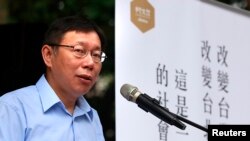Taiwan voters will pick city and county leaders in elections this Saturday. If the ruling Nationalist Party (KMT) loses seats, that outcome would signal that voters want change, including a review of the party’s pursuit of deals with Taiwan’s old rival China.
Voters across Taiwan will elect mayors and county magistrates Saturday in a poll seen as a barometer of popular support for a ruling party that has made a name by signing economic deals with China. Election losses for the Nationalists would make the 2016 presidential election easier for the chief opposition party, putting relations with China at risk.
Ross Feingold, Taipei-based senior adviser with American political risk manager DC International Advisory, said China policy will be a factor even in the local polls.
“Normally one would expect a local election to be about local politics, though we know historically in Taiwan local elections are often made out to be about broader national issues or cross-Strait issues,” said Feingold.
After six decades of hostility toward Taiwan, China began negotiating trade, transit and investment deals under President Ma Ying-jeou from 2008, as his party wanted more engagement.
That dialogue replaced Taiwan’s pursuit of legal independence from China.
Beijing has seen self-ruled Taiwan as part of its territory since the Chinese civil war of the 1940s. Taiwan’s economy has also gotten a lift from the 21 deals signed to date.
The Nationalists are running tough campaigns in nine cities and counties against the opposition Democratic Progressive Party. The opposition takes a guarded view on relations with China and advocated legal independence for Taiwan when it ruled from 2000 to 2008, angering Beijing.
Joanna Lei, chief executive officer of the Chunghua 21st Century Think Tank in Taiwan, said the Nationalists must win Saturday to feel confident in their 2016 presidential campaign. She said China will be open to either winner.
“If KMT loses, it will come into the 2016 elections on the back of a really poor administration, low level of morale and insufficient local support, so 2016 will be very difficult for KMT. I think mainland China has gradually learned that the best way for them to decide which side to deal with is to wait until the voters in Taiwan decide,” said Lei.
The Nationalists are fighting against poor approval ratings for President Ma and sentiment left over from mass protests of March and April, when thousands of people occupied parliament and surrounding streets in Taipei to oppose the Nationalist government’s agreements with China. The president says those deals have brought trade, jobs, tourists and investment to the island.




